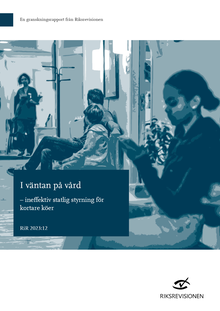Attempts to reduce waiting times in health care have been inefficient
The Government has made several efforts to reduce waiting times in health care. The Swedish National Audit Office’s audit shows that these efforts have had little impact and that waiting times remain long.

Swedish health and medical care performs well, but extensive waiting times are a long-standing problem. The central government has carried out several initiatives, the most important of which are the health care guarantee, the ‘waiting list billion’ and standardised care pathways in cancer care.
The Swedish National Audit Office’s audit shows that, overall, these initiatives have not been effective.
The health care guarantee serves a purpose by setting limits on the waiting times. However, the fact that waiting times have continuously increased since the guarantee was legislated in 2010 suggests that it has not been effective.
The ‘waiting list billion’ had some impact when it was introduced, but it is questionable whether this was due to more people actually receiving care or to administrative measures, such as cleared waiting lists. The long-term effects of performance compensation schemes such as the ‘waiting list billion’ is unclear. As the Government is now proceeding with a new ‘waiting list billion’, the effects need to be followed up.
Standardised care pathways in cancer care have had some positive effects. They stimulate organisational development and their introduction has led to reduced waiting times for several types of cancer diagnoses. However, the disparity in waiting times between regions has not diminished and there are indications that waiting times have increased after the COVID-19 pandemic.
The audit also shows that the central government policy instruments may risk leading to crowding out of patients with greater health care needs, as health care providers try to stay within the time limits.
“There is a risk that too short time limits lead to medical priorities being jeopardised and crowding out of patients with greater health care needs. This risk applies to both the requirement of the health care guarantee that everyone shall get a medical assessment in primary health care within three days and some of the time limits within the standardised care pathways,” says Filippa Hagersten, project leader for the audit.
The Swedish National Audit Office also notes that the criteria for initiating a standardised care pathway needs to be investigated. There is a risk that criteria that are too broad lead to patients with a low risk of cancer being given too high a priority, thus crowding out more urgent care.
“Waiting times in health care is a complex issue that requires a combination of policy instruments to function efficiently. In our recommendations, we highlight the importance of strengthening follow-up and adapting the central governance to the regions’ various organisations, approaches and conditions,” says Auditor General Helena Lindberg.
Recommendations in brief
The Swedish National Audit Office’s recommendations to the Government include the following:
- Strengthen follow-up, for example by improving the quality and content of national waiting time statistics.
- Follow up the effects of the new ‘waiting list billion’.
- Follow up the effects of the standardised care pathways on patients’ health care outcome.
- Reduce the risk that central government policy instruments will lead to crowding out. With regard to the health care guarantee, the Government should prolong the current maximum waiting time to an assessment in primary health care from three to seven days. With regard to standardised care pathways, the Government should ensure that overall priorities in the health care sector as a whole are taken into account when setting lead time targets. The Government should also ensure that the criteria for initiating standardised care pathways are not so broad that an unnecessarily large number of people are investigated for cancer.
See the report for the recommendations in full.
The health care guarantee contains statutory maximum waiting times for parts of the health care chain. If the limit is exceeded, the patient must be offered care at another health care provider or in another region.
The waiting list billion (2009–2014) refers to the stipulation that regions fulfilling the health care guarantee receive performance-based compensation. Central government costs amounted to SEK 6 billion. Since 2019, there is an updated waiting list billion under way, which is designed somewhat differently.
The standardised care pathways in cancer care describe the kind of health care that is to be provided and within what time frame for various cancer diagnoses. Central government costs have so far been SEK 3.6 billion.
Press contact: Olle Castelius, phone: +46 8-5171 40 04.
Presskontakt: Olle Castelius , telefon: 08-5171 42 06.
Share in social media and by e-mail
Contact form
Send your questions or comments via the form below and we will make sure that they reach the right member of staff. Please state if your question concerns the information on this particular page.


